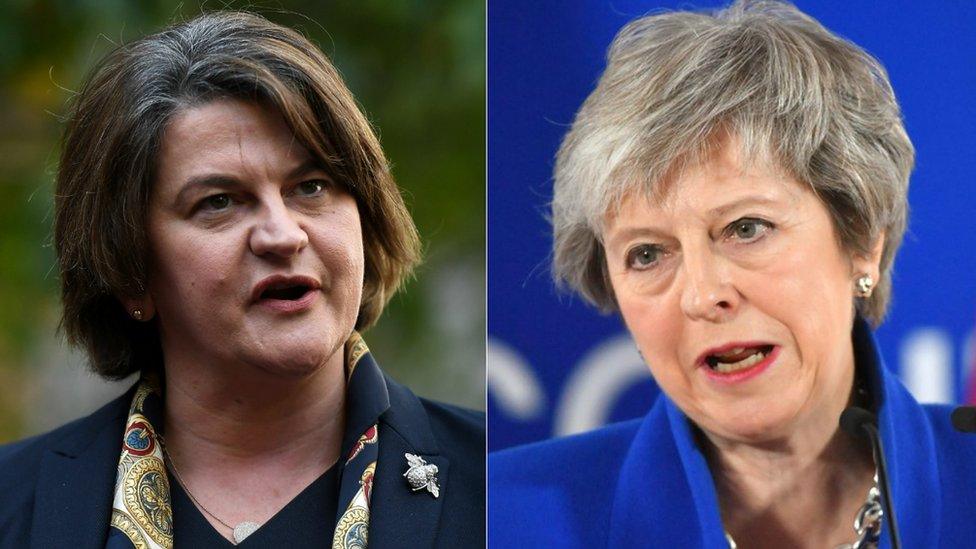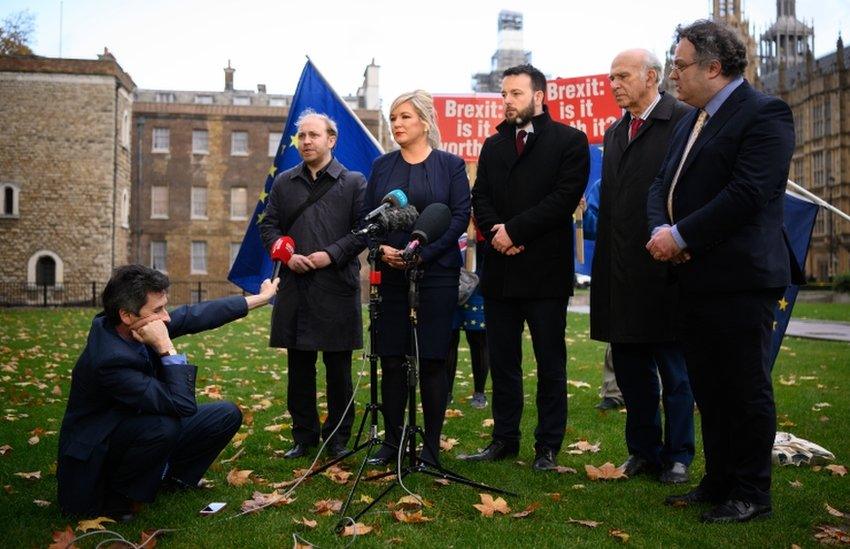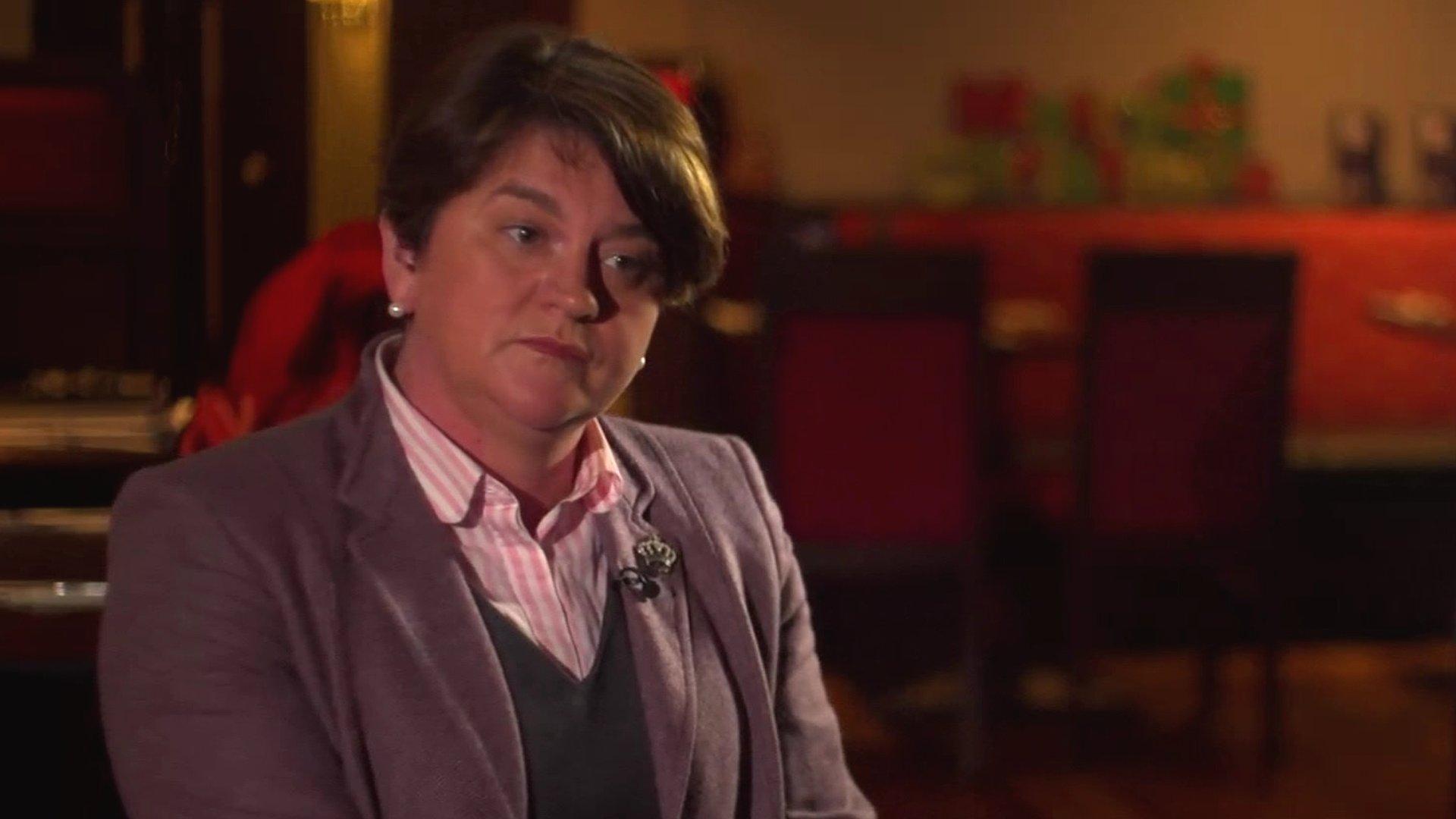May likely to face mixed reception on NI visit
- Published

Arlene Foster's meeting with Theresa May will be civil in spite of the DUP leader's criticism of the PM
Politics can be a topsy-turvy business.
Not so long ago, the four Stormont parties opposed to Brexit complained that Theresa May was refusing to see them as a joint delegation.
But the EU's chief negotiator Michel Barnier and Westminster opposition leaders had been happy to meet them.
Now their - still separate - encounters with the prime minister at Stormont promise to be rather more consensual than Mrs May's meeting with her semi-detached parliamentary allies in the DUP.
Sinn Féin, the SDLP, Alliance Party and the Greens have all made it clear that while they don't regard Mrs May's deal as perfect, they believe her Northern Ireland backstop is the best of a bad job.
That contrasts with the reception she is likely to get from the DUP, who insist the PM is wasting her time trying to sell the backstop to the four corners of the UK.
The tone of the discussion between Mrs May and DUP leader Arlene Foster will no doubt be civil.
But the DUP's Sammy Wilson made clear the party's general stance, posing in front of a No Way, May poster.
The two camps at Stormont might seem diametrically opposed but when it comes to the numbers game at Westminster they are in a strange way almost on the same side.
Sinn Féin - in spite of goading from Taoiseach (Irish prime minister) Leo Varadkar - will stick to its abstentionist approach, meaning its MPs will not ride to the defence of the backstop.
'Best of a bad job'
On top of that, as things stand the Labour Party, the Liberal Democrats and the English Greens aren't listening to their Stormont sister parties, the SDLP, Alliance and Greens NI respectively.
All of them have decided that rather than backing the backstop they want to push the case for either a general election or another referendum on EU membership.
So as things stand the only Northern Ireland vote it looks like the prime minister can count on will be that of the independent unionist MP Lady Sylvia Hermon, a remainer who seems likely to take the view that the existing deal is the best of a bad job.

Sinn Féin, the SDLP, Alliance Party and the Green Party say the deal isn't perfect but they support it
The North Down MP used to be a member of the Ulster Unionists, the majority of whom opposed Brexit in 2016.
Now her old party takes the view that Brexit should happen, but thinks - given the messy state of the negotiations - that the PM should consider extending Article 50.
There's been some speculation that the DUP MPs might be persuaded to abstain rather than vote against the deal.
Frankly that seems highly unlikely at this point - the party has made clear it regards the differential treatment of Northern Ireland as an essential point of principle.
'In new territory'
If the DUP abstained on what it has declared to be such a vital matter, would that not open them out to criticism for being - in practice - almost as abstentionist as Sinn Féin?
Should the government lose the meaningful vote, then the DUP and many other MPs will find themselves in new territory.
Recently it has been at pains to stress - under pressure from Northern Ireland business leaders - that it favours a better deal, not no deal.
Could that - as one DUP source suggested to me on the margins of their conference last weekend - be some kind of guarantee that the UK would never use the backstop, but would always extend its period of transition away from the EU in preference?
Or would the defeat of Mrs May's deal bring other ideas - such as continued UK wide membership of the Customs Union and the Single Market into play?
For now Mrs May's message - in Northern Ireland as elsewhere - is that there is no alternative.
Her problem is that so far as Northern Ireland is concerned, 10 MPs don't believe her, one does and the remaining seven won't be in either lobby on 11 December.
- Published27 November 2018
